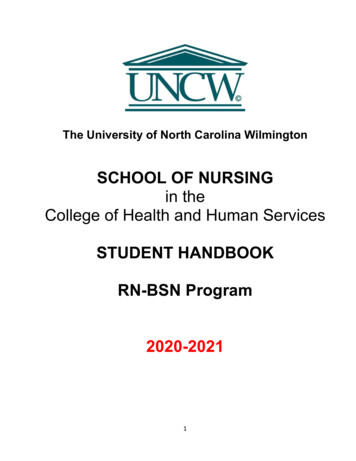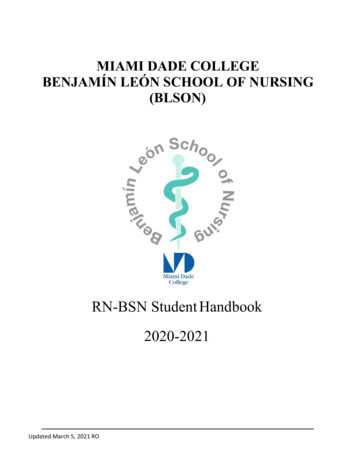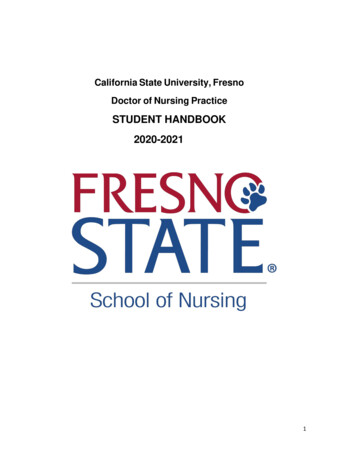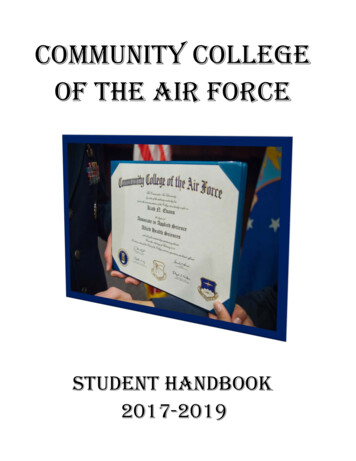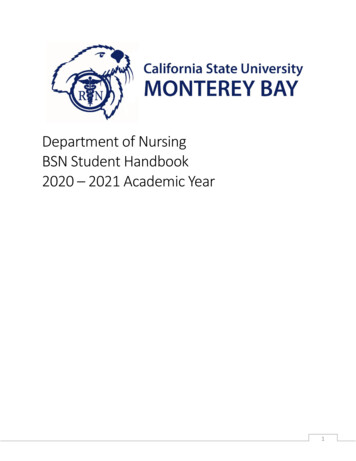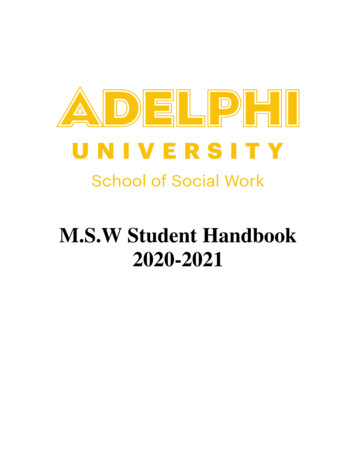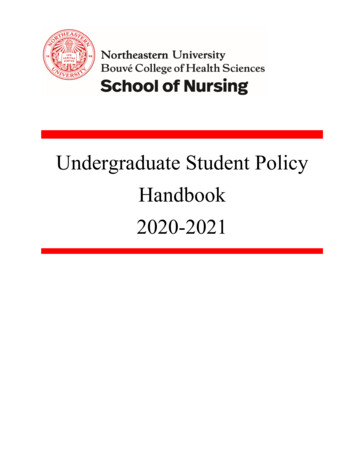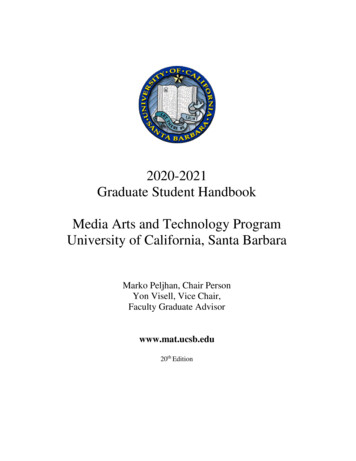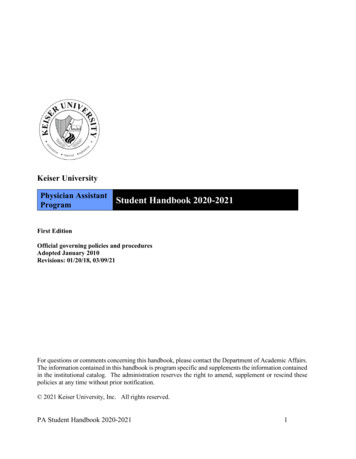
Transcription
Keiser UniversityPhysician AssistantProgramStudent Handbook 2020-2021First EditionOfficial governing policies and proceduresAdopted January 2010Revisions: 01/20/18, 03/09/21For questions or comments concerning this handbook, please contact the Department of Academic Affairs.The information contained in this handbook is program specific and supplements the information containedin the institutional catalog. The administration reserves the right to amend, supplement or rescind thesepolicies at any time without prior notification. 2021 Keiser University, Inc. All rights reserved.PA Student Handbook 2020-20211
Physician Assistant ProgramSTUDENT HANDBOOK 2020-2021Table of ContentsPA Program Faculty & Staff Directory . 4I. GENERAL INFORMATION . 5Introduction . 5University History . 5Accreditation . 5University Mission. 5Program Mission. 6Program Goals . 6Americans with Disabilities Act . 6Technical and Professional Standards . 7Program Technical Standards. 7Standards of Conduct . 8Academic Honesty Policy . 9Sanctions for Academic Dishonesty . 9II. ACADEMICS . 10Academic Advisement . 10Grading Policy . 10Requirements for Program Completion . 11Graduate Satisfactory Academic Progress . 12Deceleration. 13Remediation. 13Leave of Absence Policy. 14Withdrawal Policy . 14Military Deployment Policy . 14Re-Admittance Policy . 14Professionalism Policy . 15Attendance Policy . 16Unexcused Absences . 17Examination Policy. 17III. ADMINISTRATIVE POLICIES AND PROCEDURES . 21Advanced Placement. 21Employment Policy . 21Email Policy . 21Referral Service Policy and Procedure . 22Clinical Site Policy . 22Student Travel Policy. 22Student Health Service Policy . 22Student Health Records and Immunization Policy . 22Student Grievances . 23Grievance Policy and Procedure. 23PA Student Handbook 2020-20212
Confidentiality . 24HIPAA . 24Privacy of Student Records . 24Sexual Harassment. 25Title IX Compliance . 25Latex Allergy . 25Universal Precautions . 26Incident Reports/Accidents/Medical Care . 26Biohazard Exposure and Reporting . 26Keiser University PA Program Curriculum . 27IV. MISCELLANEOUS . 29The PANCE Examination . 29Medical Diagnostic Equipment . 29Dress Code . 30Parking . 31Medical Emergencies . 31Campus Safety . 31Weather Alerts . 31Writing Studio . 32Student Responsibilities . 32PA Program Responsibilities. 32Receipt & Acknowledgment of Policies, Procedures & Materials . 33V. DIDACTIC APPENDICES . 34Student Absence Reporting Form. 35Criminal Background Check & Drug Screening Policy/Waiver. 37Student Authorization to Release Health Information . 40Schedule Disclaimer . 41Keiser University Physician Assistant Program Professionalism Rubric . 42Student Encounter Form . 47Guidelines for Ethical Conduct for the Physician Assistant Profession . 49Competencies for the Physician Assistant Profession . 53PA Student Handbook 2020-20213
PA Program Faculty & Staff DirectoryPhysician Assistant Program Faculty, Staff and AdministrationTITLEFaculty and Staff DirectoryNAMEProgram DirectorRenee Levy, MMS, PA-CMedical DirectorManuel Porth, MDClinical DirectorAnnette Sophin, MSMM, PA-CClinical CoordinatorRebecca McLaughlin, MMS, PA-CPrincipal FacultyKaren Scotti, DC, MBAPrincipal FacultyChristine Kessler,D.Ed., M.M.S., PA-CPrincipal FacultyCarolina Dickson, MPAS, PA-CAdjunct FacultyThomas Panavelil, PhDAdjunct FacultyCharles Powell, PhDAdjunct FacultyBoris Djokic, PhDAdministrative AssistantNieves GarciaData ManagerVacant positionAdmissions ManagerNikki SawyerPA Student Handbook wyer@keiseruniversity.edu954-776-44564
I. GENERAL INFORMATIONIntroductionWelcome to the Keiser University Master of Science in Physician Assistant Program. We have beengraduating Physician Assistants since 2011. This is a very important period in your academic career. Wehope that you will take this opportunity to continue your personal and professional growth.This handbook contains the rules and regulations that govern the program. Many of the policies andprocedures are program specific and will supersede all other Keiser University policies. After the programreview, please read your manual carefully and be sure to clarify any questions. Your signature at the endis your acknowledgement of these policies.University HistoryKeiser University was established by the Keiser family in 1977. It is a regionally accredited, private, careeruniversity offering undergraduate and graduate degrees. The founders, Dr. Arthur Keiser and Mrs. EvelynKeiser, felt that South Florida needed a private career college providing realistic hands-on training in acaring, conscientious and professional manner. The University has grown rapidly over the past decadesand has received numerous awards and recognition for its achievement in furthering career education inFlorida.The main campus is in Fort Lauderdale with additional campuses located throughout the State of Floridaand internationally. Keiser University is accredited by the Southern Association of Colleges and Schools,Commission on Colleges, at 1866 Southern Lane, Decatur, Georgia 30033-4097, (404) 679-4500. KeiserUniversity is licensed by means of accreditation by the Commission for Independent Education, 325 WestGaines Street, Suite 1414, Tallahassee, FL 32399-0404.AccreditationAt its September 2018 meeting, the Accreditation Review Commission on Education for the PhysicianAssistant, Inc. (ARC-PA) extended Accreditation-Probation status for the Keiser University PhysicianAssistant Program sponsored by Keiser University until its next review in September 2020. A finaldetermination on accreditation status is expected to be made by the Commission in July 2021.Probation is a temporary status of accreditation conferred when a program does not meet the Standards andwhen the capability of the program to provide an acceptable educational experience for its students isthreatened. Once placed on probation, programs that still fail to comply with accreditation requirements ina timely manner, as specified by the ARC-PA, may be scheduled for a focused site visit and/or risk havingtheir accreditation withdrawn.Specific questions regarding the program and its plans should be directed to the Program Director and/orthe appropriate institutional official(s).University MissionKeiser University is a regionally accredited, private, career university that provides educational programsat the undergraduate and graduate levels for a diverse student body in traditional, nontraditional, and onlinedelivery formats. The main campus is located in Fort Lauderdale with campuses located throughout thePA Student Handbook 2020-20215
State of Florida and internationally. Through quality teaching, learning, and research, the university iscommitted to provide students with opportunities to develop the knowledge, understanding, and skillsnecessary for successful employment. Committed to a “students first” philosophy, Keiser Universityprepares graduates for careers in business, criminal justice, health care, technology, hospitality, education,and career-focused general studies.Inherent in the Mission is service to the community. This service includes community partnerships,involvement with various constituencies and various continuing education programs.Program MissionThe Keiser University Physician Assistant program provides an environment that fosters quality academicand clinical education. The program, in collaboration with the community, educates physician assistantstudents to excel in integrative patient care, education and service to benefit the public. Furthermore, theprogram promotes lifelong responsibility for ongoing learning and active participation in a changinghealthcare environment.Program GoalsGoal 1: Maintain high-quality PA program faculty.Goal 2: Prepare students for integration into clinical practice.Goal 3: Develop students who demonstrate characteristics of caring healthcare providers.Goal 4: Graduates will be able to provide healthcare services to improve the health of the public.Goal 5: Ongoing instructional and programmatic self-assessment for the maintenance of accreditation.Americans with Disabilities ActKeiser University complies with the Rehabilitation Act of 1973 (Section 504) requiring that no qualifiedhandicapped person will be excluded by reason of the handicap from enrolling in a course of instruction.Students wishing to avail themselves of special adjustments/accommodations under the Americans withDisabilities Act (ADA) must disclose special needs at the time of enrollment. Accordingly, every effort ismade to make reasonable adjustments/accommodations. Please consult the Campus President to seekaccommodations under ADA.The following individual is Keiser University’s Section 504 Coordinator:Dr. Christopher Stabile, Associate Vice Chancellor of Teaching and LearningKeiser UniversityOffice of the Chancellor1900 W. Commercial Boulevard, Suite 180Ft. Lauderdale, Florida 33309Tel: (954) 776-4476cstabile@keiseruniversity.eduAll students accepted into the Program must sign a statement that they have read, understand and are ableto meet the technical and professional standards, with or without reasonable accommodations. Thestandards apply to all phases of the Program, including admissions, matriculation, and graduation.PA Student Handbook 2020-20216
Technical and Professional StandardsPhysician Assistant (PA) training is recognized as a broad-based process that requires the acquisition ofgeneral knowledge in all fields of medicine and of the basic skills required for the practice of medicine,regardless of specialty. The education of a PA student in the Keiser University Physician Assistant Programrequires assimilation of knowledge, acquisition of skills, and development of judgment through patientcare experience in preparation for semi-autonomous and appropriate decision making required in medicalpractice. The current practice of medicine emphasizes collaboration among physicians, other allied healthcare professionals such as PAs, patients, and families.The Program Technical and Professional Standards, as distinguished from Academic Standards, refer tothose physical, cognitive, and behavioral abilities necessary for satisfactory completion of all aspects ofthe Program curriculum. This includes the development of professional attributes required by the facultyof all Program students by the time of graduation and for future practice as a certified and licensed PA.The Program standards and essential functions of medical education shape the requirements for admission,retention, and graduation of applicants and students. All graduates are expected to be qualified to enter afield of PA practice of their choice.Students applying to the Program are selected based on academic achievement, faculty evaluations, andevidence of maturity, motivation, leadership, integrity, and compassion. Students must be capable ofmeeting the Technical and Academic Standards described herein.The medical education process involved in the Program focuses largely on the care of patients and differsmarkedly from postsecondary education in fields outside of the health sciences. The primary responsibilityfor the selection of students and for the content of the curriculum rests with the Program and its faculty.The Technical Standards, as outlined below, along with the PA program policies, procedures and processfor the admission and education of PA students, parallel, to some extent, those set forth by the PhysicianAssistant Competencies published by the American Academy of Physician Assistants (AAPA). Theyinform and guide the decisions of the Program faculty. All students of medicine, including PA students,must possess those intellectual, ethical, physical, and emotional capabilities required to undertake the fullcurriculum and to achieve the levels of competence required by the faculty.Program Technical StandardsA candidate for the Physician Assistant Program must have abilities and skills inclusive of, yet not limitedto, the major categories listed below. Technological compensation can be made in some of these areas, buta candidate must be able to perform in a reasonably independent manner.1. Observation: Candidates and students must have sufficient vision to be able to observedemonstrations, experiments and laboratory exercises held throughout the program.They must be able to observe a patient accurately at a distance and close at hand.2. Communications: Candidates and students should be able to speak, hear and observeto elicit information, examine patients, and perceive nonverbal communications. Theymust be able to communicate effectively and efficiently in oral and written for
Physician Assistant (PA) training is recognized as a broadbased process that requires th- e acquisition of general knowledge in all fields of medicine and of the basic skills required for the practice of medicine, regardless of specialty. The education of a PA student in the
